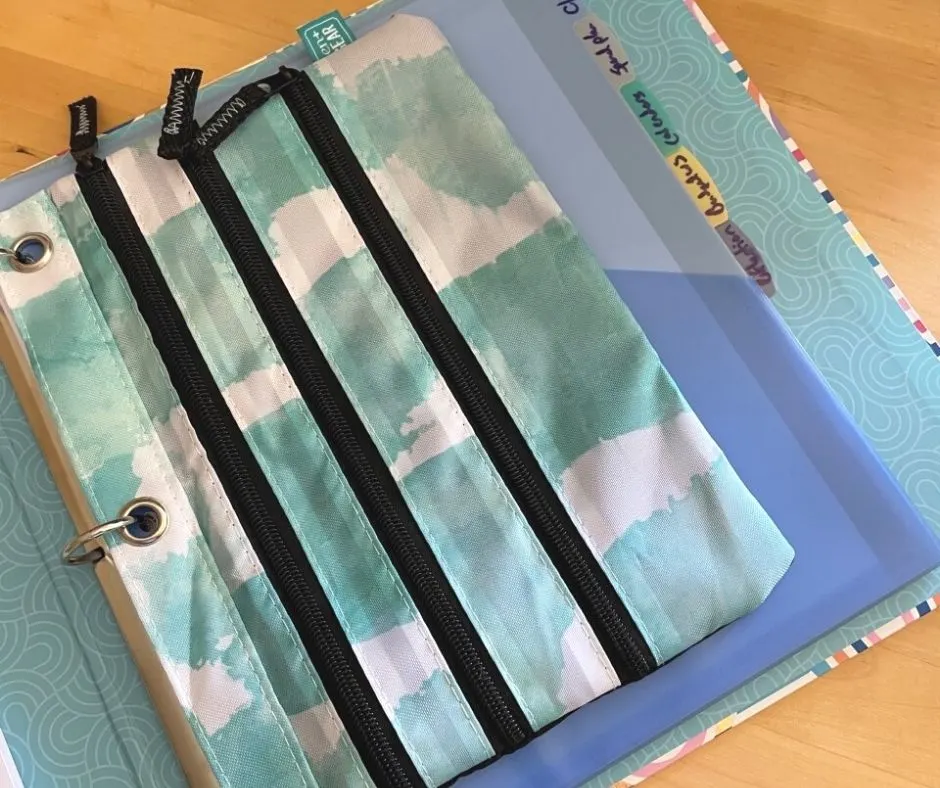Help guide your child through creating a budget, using the budget, and learning from it with these teenage budgeting tips.
While you’ll find kernels of the “typical budgeting advice” in this list of teenage budgeting tips, you’ll also see that a lot of the advice is different.

That’s because managing money as a teen comes with its own set of challenges.
For starters, some teens don’t earn consistent income (or any income at all). They have hardly any life experience with budgeting. And they’ll need to work with their parents, as managing money as a teen is a joint effort.
Let me show you how to guide and help your teenager through their first (and next) budget.
Teenage Budgeting Tips
Help your teen develop a really important life skill – setting a budget plus actually using it – with these teen budgeting tips.
Tip #1: Set Budgeting Up as an Expected Money Chore
You can introduce budgeting as a money chore for your teen to do each week. And to set up this expectation – that budgeting is something to be done routinely – go ahead and print out at least 6 weekly budget sheets, hole punch them, and put them in a binder.
Your teen can learn a lot more from six weeks of doing a weekly budget, then with just doing it once or twice over the next few months.
Hint: here's a Mom who doesn't let her kids graduate from high school without handling their family's finances for 6 months. Now THERE'S some budgeting experience!
Speaking of weekly budgets…
Tip #2: Choose a Weekly Budget, until they get the Hang of Things
Speaking of once a week – a weekly budget (vs. a bi-weekly or monthly budget) is the way to go.
It’s going to help them:
- Become aware of spending issues quicker
- More easily calculate what they can spend on a daily basis
- Have a reset date that’s not too far off, in case they blow through their money too quickly
Tip #3: Have a Weekly Budget Sesh with Your Teen
This can be a really quick, 10-minute session between you guys. But it will make a big difference — in accountability, in opening up some money conversations, and in helping them learn from their budgeting and spending decisions.
Things to cover in the meeting:
- How their last budget went (of course you won’t have anything to discuss until they get one weekly budget under their belt)
- Money they expect to receive this week (from a job, allowance, babysitting, chore commissions, etc.)
- They’re proposed way to spend it, broken down by category (and possibly item – you decide)
- Help they’ll need to spend their money (will they need a ride to the store to get a birthday present, do they intend to buy something online and pay you back, etc.)
- Hash out anything you don’t approve of
Hint: you can set a rule that your teen must get your approval – via a signature – on their budget before they start to use it in real life. Here's more info on how to teach budgeting.
Tip #4: No or Little Income? Still Fill Out a Weekly Budget
Yes, they should still fill out a budget even if they don’t have much, if any, money coming in.
The reason why is because they will learn and become aware of some really important things.
Like:
- They need income/allowance/money to buy what they want and need.
- They can now see how much money they would need to afford their budget.
- After a few weeks of this, they’ll get an idea of how much they’ll need to earn per hour at their first teen job in order to afford the lifestyle they want. Here's how to get a job as a teenager.
- Etc.
Bonus: in the income section? Make sure they include resources, as well. For example, if they have a gift card they’ll be using to purchase something this week. Or a coupon for a specific need they have – show them there are other resources that will help with paying for things.
Tip #5: Frequently Look at Your Budget Categories
When you’re an adult, you kind of know your budgeting categories. Unless there’s a big transition or change in your life, then they’ll stay the same.
But a teen’s life is constantly changing as they grow into themselves and try new things. Encourage them to assess their budgeting categories often – perhaps even each week – as they have new money responsibilities, needs, and wants in their life.
Categories can include things like health and beauty, sports, after school snacks, etc. You’ll want to check out these 58 common teenage expenses to get a better idea of what to include.
Tip #6: Separate a Budgeting Problem from an Income Problem
If I were talking to an adult, then I would likely say that you probably don’t need a second or third job to make ends meet, and instead need to focus on your budgeting and prioritization skills.
But with teens? Well, it can definitely be the case that they budget just fine, and just aren’t earning enough income.
Psst: Here are 25 online jobs for teenagers that pay, plus 12 sources of income for 18-year-olds.
Tip #7: Help them Practice Planned Spending
How is your teen supposed to handle a monthly purchase or a monthly bill, on their weekly budget sheet?
It’s a common issue.
Here’s what they need to do:
- Identify the monthly expense by filling in that monthly money calendar
- Divide the total cost of their monthly expense by their budget cycle (divide by 4 for a weekly budget cycle, or 2 for a bi-weekly budget cycle) to figure out how much to set aside on each budget worksheet
- Write in a line on each of their budget worksheets for the month under “expenses” with the monthly bill/cost name and the amount they need to set aside for that week to make it work
Then here’s how they can keep track of that money until it’s going to be used.
Tip #8: Set Up a Sinking Funds Money Pouch
How can a teenager improve their budget? In my product, the Teen Budget Binder, I suggest that you set up an annual budget binder (I walk you through how to do this). It becomes an anchor point for your teen’s money management.
On top of this, I recommend that you put a binder pouch in the beginning of it that can catch their sinking funds. Sinking funds are money set aside for a specific purchase that happens infrequently – kind of like planned spending.
For example, they might pay their car insurance bill once a month, and need to set aside $25/week for this. They could add this as a line item on their weekly budget worksheet, then set the $25 into this pouch. Come the fourth week of the month, they should have $100 in there to give Mom/Dad or to pay their bill with.
Tip #9: Plan One Month Ahead
This is a really important step because what they do this week will affect other weeks in the month, and other events coming up will affect this week’s budget.
Doing this also allows them to:
- Plan ahead for costs in the weeks to come, such as a birthday gift for a friend, or a data plan bill that’s due.
- Anticipate monthly costs, and then account for those on a weekly budget (we’ll discuss how to do this in another tip).
Tip #10: The Learning is in the Follow-Up
The follow-up is when they come back to that budget worksheet at the end of the week, and they calculate their leaks and leftovers.
- Budget Leaks = budget categories where they spent more than they estimated they would when they first filled their budget out.
- Budget Leftovers = budget categories where they spent less than they estimated they would when they first filled their budget out.
By having your teen come back and audit how they did, they’ll:
- Become aware of under or over-estimating spending and bills
- Calculate how much money they have to carryover to their next budget week (or the money hole that's left for next week's budget to work out)
- Get feedback to help them tweak how they fill out their next weekly budget sheet
Speaking of the follow-up…
Tip #11: Play Red-light, Greenlight with their Budget
Much of their learning is going to come from actually trying to use the budget, and seeing the gap between their estimates and their actuals.
One way to help this along and make it very visual is by playing red-light, Greenlight.
For categories where there’s overspending at the end of the week, have them highlight the number in red.
For categories where they came in under budget, have them highlight it in green.
Obviously, you want them to get more greens than reds over the coming weeks as they learn better how to estimate where their money is going to go (and how to keep it that way, as they spend it).
Psst: Your teenager spends too much money? How to spend less money as a teenager.
Read these teenage budgeting tips over with your own teen, and start to implement them. Take action on 1-2 at a time, see how their confidence builds around it, and then choose a new one when you think they're ready.
Amanda L. Grossman
Latest posts by Amanda L. Grossman (see all)
- 50 Banking Activities for Kids (Student Financial Literacy) - February 14, 2024
- 14 Christmas Activities for High School Students (they’ll Actually Find Cool) - December 1, 2023
- 3 Fun Selfie Scavenger Hunts for Teens (Christmas, Fin Lit, etc.) - November 27, 2023


Muniru Kamulegeya
Tuesday 30th of November 2021
This is really good.
Amanda L. Grossman
Tuesday 7th of December 2021
Thanks so much for taking the time to read it, and tell me! That means a lot.